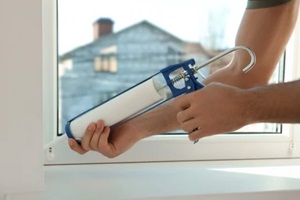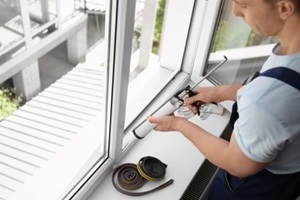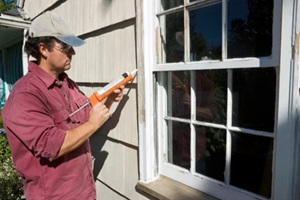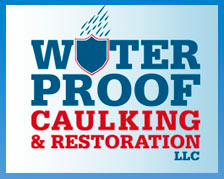 As a property owner in North Philadelphia, keeping your building well-maintained and up to code is important. One key area that must meet city regulations is caulking, especially in older properties. Using the proper commercial-grade caulking and skilled technicians is essential to meeting North Philadelphia’s exacting standards.
As a property owner in North Philadelphia, keeping your building well-maintained and up to code is important. One key area that must meet city regulations is caulking, especially in older properties. Using the proper commercial-grade caulking and skilled technicians is essential to meeting North Philadelphia’s exacting standards.
The Philadelphia Plumbing Code sets forth caulking requirements for materials, applications, and inspections. Failure to comply with these codes can lead to violations, fines, and orders to redo substandard work.
An experienced commercial caulking company can navigate these codes properly to ensure compliance for caulking in North Philadelphia.
North Philadelphia Building Code Requirements
The Philadelphia Plumbing Code regulates caulking materials and practices for commercial buildings in North Philadelphia. Relevant requirements cover:
Caulking Standards
All caulking must adhere to the code’s performance standards. Joints must be watertight and gastight, with no uncured paints or putties.
Hardened caulking should bond firmly without cracks or pinholes. The code prohibits certain deficient caulking materials prone to early failure.
Approved Caulking Materials
Only certain caulking materials meet code compliance for commercial buildings. These include oakum, hemp, molten lead, and other materials outlined in Chapter 3 of the code.
For example, minimum lead depth and other dimensions are specified for cast iron joints. Any material not explicitly allowed under the code requires special approval.
Prohibited Caulking Substances
The Philadelphia code expressly prohibits several caulking materials. These include non-lead solder and no-hub couplings joining certain piping combinations above ground.
Using banned materials can force removal and re-caulking at the owner’s expense.
Inspection and Approval Process
All commercial caulking work must pass inspection by the Philadelphia Department of Licenses and Inspections. Inspectors check that materials and applications adhere to code standards.
Any identified deficiencies must be corrected and re-inspected until final approval is obtained. Failing to pass inspection can lead to fines or legal orders.
Proper Commercial Caulking Practices
Navigating building codes requires proper materials and workmanship. Reputable commercial caulking firms have the experience to meet Philadelphia’s stringent standards.
Commercial-Grade Caulking Materials
 Commercial caulking technicians use only approved, code-compliant caulking compounds. These commercial-grade materials are more reliable and durable than homeowner-grade products. Only commercial caulks meet standards for gasses, moisture, and longevity.
Commercial caulking technicians use only approved, code-compliant caulking compounds. These commercial-grade materials are more reliable and durable than homeowner-grade products. Only commercial caulks meet standards for gasses, moisture, and longevity.
Skilled Commercial Caulking Technicians
Applying commercial caulking to code requires skilled professionals using proper techniques. Commercial crews are experts in approved materials, specialized equipment, joint configurations, application methods, and curing times. Attempting commercial caulking without this expertise often leads to failure.
Thorough Surface Preparation
Before caulking, technicians must thoroughly clean and prep every joint surface. This involves removing old caulking, cleaning with solvents, and scraping or abrasive blasting.
Proper prep ensures maximum adhesion and a long-lasting seal. Poor surface prep causes the new caulk to fail prematurely.
Precise Application Techniques
Caulking crews must expertly force material deep into joints in a continuous bead. Proper nozzle angles, bead width, injection pressure, and consistency are essential.
Rushing this process or using a sloppy technique leads to non-compliant bonds or seal failure, allowing moisture to penetrate.
Careful Curing Procedures
New caulk requires careful curing to harden while avoiding shrinkage cracks. Technicians must follow curing specifications such as temperature, humidity, ventilation, and protection from disturbance.
Curing mistakes can create code violations and lead to seal failure.
Complete Documentation and Reporting
Meticulous records aid code compliance and inspection. Commercial crews document all materials, applications, curing, and test results.
Detailed logs prove adherence to standards for approval. Photographs also document joint configurations and bead quality to building officials.
Meeting Inspection and Approval Standards
Even proper commercial caulking applications must pass Philadelphia code inspections. Preparing for and completing this process is essential yet challenging.
Preparing for Building Inspections
The key is having complete records and repaired joints ready to demonstrate code compliance. Photographs, product information, application logs, and examples of finished caulk beads should be organized for easy review.
Technicians may also perform sample adhesion tests for inspectors.
Demonstrating Code Adherence
Inspections require showing how materials and methods meet Philadelphia standards. This includes caulk type, surface prep, application consistency, width-to-depth ratio, absence of cracks, and proper curing conditions.
All facets must adhere to code requirements.
Making Any Required Repairs
 Inspectors may identify minor deficiencies that need rework before final approval. These must be repaired using proper commercial materials and methods.
Inspectors may identify minor deficiencies that need rework before final approval. These must be repaired using proper commercial materials and methods.
Technicians examine all joints for potential trouble spots that need attention beforehand to prevent rejection.
Securing Final Approval
The last step involves demonstrating compliance in every area of the project. After any repairs, the inspector should determine that caulking meets all Philadelphia Plumbing Code standards. Only then is final approval granted.
Proper Commercial Waterproof Caulking in North Philadelphia with Waterproof Caulking & Restoration
Understanding North Philadelphia’s building codes and caulking requirements ensures property owners can avoid problems. Hiring a reputable commercial waterproofing and caulking firm is the best way to meet the city’s strict standards.
Work with Waterproof Caulking & Restoration to safeguard your next residential project against these risks. Our commercial-grade products, equipment, and highly experienced crews ensure every job is up to code.
Contact us today at 484.265.9646 or schedule a consultation online for high-quality caulking services guaranteed to meet Philadelphia’s stringent building code compliance.
